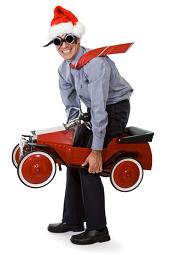
There is a whole lot of holiday trickery beyond (spoiler alert, kids/late-blooming adults) the mythology of Santa Claus.
Drivers caught unaware of less obvious holiday tricks can land in cold car insurance waters.
In this entry of Auto Insurance in Unlikely Places, a review of when glad tidings go bad (and what it means in terms of auto coverage) for any holiday imbiber who thinks that one night’s sleep means a sober morning and a jokester whose behind-the-wheel cookie joke goes stale with a cop.
Study: Hair of (Last Night’s) Dog Still Bites
There are some cases where the holiday spirit stays longer than invited (aside from that drunk uncle).
A study from researchers in the United Kingdom warns unknowing drinkers that alcohol can stay in the body for longer than expected. And with the holiday spirit(s) still strong in nighttime-drinkers-turned-early-morning-drivers, Fleet News reported that cheer should be conducted with some caution.
“It’s easy to assume that after a good night’s sleep you will be sober enough to drive the next day, but depending on how many units you’ve had, you may not be fit to drive,” John O’Roarke, a managing director at the U.K. insurer behind the research, said in the Fleet News report. “The key to enjoying the festive season is to plan ahead and don’t drive if you are not within the legal alcohol limits.”
So rejecting the morning’s “hair of the dog” treatment might not even be good enough for a driver looking to get behind a wheel come sunrise—turns out that it’s last night’s dog that likely still has bite for that night drinker looking at that morning drive.
According to the study, the average “morning-after” driver is on the road too soon, often getting behind the wheel hours short of being below the legal alcohol limit for driving.
In fact, nearly half of drivers surveyed for the research underestimated the window of time they needed between finishing a glass and turning the ignition or “had no idea how long it would take.”
Misjudging that window yielded some nasty consequences for U.K. drivers in recent years, with police there arresting more drunk drivers between the morning hours of 4 a.m. and 6 a.m., Fleet News said.
Don’t think that the problem is staying on one side of the pond.
American authorities are just as wary as Britons are of drunk driving during the holidays, a problem that the U.S. Department of Transportation (DOT) said is linked to about 37 percent of crash deaths around Christmas.
DOT officials said that the figure is one reason they are publicizing a ramped-up crackdown on drunk driving with its “Drive Sober or Get Pulled Over” campaign that runs until January 1.
Previous research from Online Auto Insurance pegged numbers to what a DUI mark means to a typical 20-year-old looking for auto insurance quotes. But it’s not just pricier quotes: a DUI could mean little choice for that 20-year-old but a high-risk auto insurer.
Cookie Humor Gets Behind the Wheel, Falls Short with Police
It’s now more than apparent that the holiday drink can be a problem, even hours after it’s enjoyed.
But how can a holiday cookie go wrong?
A comedian in California answered that question, with the help of police.
Media outlets reported that Randy Liedtke baked cookies to look like iPhones that he would “talk” into while driving, trying to goad police into what would start as a traffic stop and end as a pastry lesson.
Huffington Post Canada reported that Liedtke illuminated his punchline via social media: “Baked some iPhone cookies to trick cops into pulling me over, then I just take a bite and ask if cookies are against the law.”
The humor of the trick was lost on a policeman that Liedtke said was “confused and angry” about the stunt, according to a followup Yahoo! Shine report.
The humor even faded for Liedtke himself, who, in a Twitter post, described the entire episode as not “worth it,” himself as “an idiot,” and “no more iPhone cookies” in the near future.
Liedtke’s joke-turned-ticket is a fitting case to review during the holidays, when authorities who are in no mood for jokes amp up their battle against distracted driving.
Laws have gotten harsher against distracted driving in recent years, with states across the U.S. instituting a range of bans on the use of handheld and mobile devices behind the wheel.
Some car insurers have followed suit. Online Auto Insurance found that, as states’ anti-distraction laws began to take root across the U.S., some insurers incorporated texting-related tickets into their quotes for auto coverage. It meant a quasi-tax of higher rates for previously distracted drivers, now deemed risky by mounds of research and reports.
Now, authorities who had found anti-distraction laws initially difficult to enforce are getting better at catching a driver who is texting or talking on a phone while driving.
So apologies to all distracted drivers who planned to use the holiday cookie joke to slink out of a ticket: that joke’s already been told.